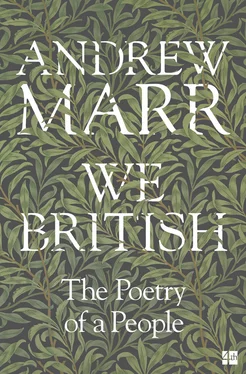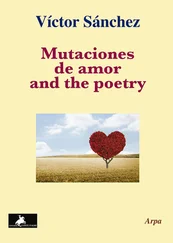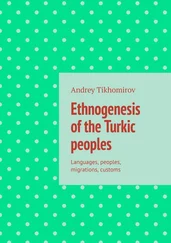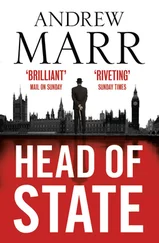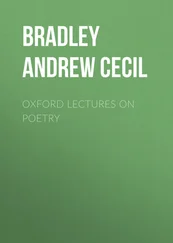I hope it’s obvious by now that Caedmon wouldn’t have thought of himself as English – England as a country name didn’t yet exist. His very name is probably Celtic, and alongside the Irish he’d have known in his monastery there were almost certainly Scandinavians too. It wasn’t at all obvious that the west Saxons and their language would eventually triumph, or that the people of the biggest bit of the archipelago would one day call themselves English. Politically, everything was still up for grabs. We know this by looking at other early poems. For instance, ‘The Battle of Maldon’ is about a defeat of the English by the Danes, while ‘The Battle of Brunanburg’ describes a close-run-thing victory by Aethelstan, the ruler of Wessex, often described as the first King of England, over an alliance between the Viking King of Dublin, the King of the Picts and the Scots.
As the relentless warfare went on, almost everywhere Christianity was gaining ground. But outside the monasteries, almost everywhere, the older beliefs remained potent. This was a world still confused about the contradictions between the old Norse warrior culture, which was pagan and toughly pessimistic, and Christianity. The enormous poem Beowulf – not even set, by the way, in Britain but in Denmark – is famously confused between its Christian vision and its pagan funerals. Beowulf is famous but it’s not much fun, except in the modern translation and rewriting by Seamus Heaney. Instead, here’s something from the wonderful ecstatic poem ‘The Dream of the Rood’, in which the anguish of daily life is confronted by God Almighty, who seems to be something like a young Saxon chieftain:
then the young warrior, God Almighty,
stripped himself, firm and unflinching. He climbed
upon the cross, brave before many, to redeem mankind.
I quivered when the hero clasped me …
… now I look day by day
for that time when the cross of the Lord,
which once I saw in a dream here on earth,
will fetch me away from this fleeting life
and listening to the home of joy and happiness
where people of God are seated at the feast
in eternal bliss …
Here is a Warrior Christ, more like a Viking than a Hebrew figure, sitting down for a good old-fashioned feast – the early British didn’t have much to compare things to, beyond their own lives and culture.
What sustained them? Apart from the hope of heaven, the answer is the security of their extended families or clans: thirty-five distinct tribes were recorded around the time of Caedmon’s hymn. The most heavily populated areas were still the lowland farming territories, whose forests had been felled, and land ploughed, in prehistoric times. The Anglo-Saxon landscape was already old and heavily marked by the huge expansion of farming in the Bronze Age, and the burial mounds, castles and henges of earlier Britons. Caedmon’s people lived in a haunted landscape. Much of the infrastructure of Romano-British culture remained semi-intact. The new Saxon settlement of Lundenwic, just to the west of the walls of Roman Londinium, had well-built-up river embankments and trade facilities. To the north, towns such as Newcastle kept their Roman names well into the 400s; York was a well-established Christian centre from Roman times.
People lived in their local tribal polities, but they travelled widely. Saxon roads, unmetalled, have rarely survived, but Roman roads were still being heavily used, and archaeology confirms that there was a vigorous shipping economy and trade with the Continent. Whether trading, raiding or fishing, the Anglo-Saxon British were at least as much a seafaring race as the British of the time of Raleigh, or Nelson. Hardly any of their boats survive, for obvious reasons, but there are two substantial ships, one from the famous Sutton Hoo burial, and the other from Graveney in Kent. Modern reconstructions of these clinker-built vessels (that is, overlapping planks, pinned together) suggest that they could travel long distances at around ten knots, a considerable speed, using a coarse cotton sail. Though very different from the sleeker Viking longships, these Saxon vessels could also be rowed at speed up rivers and along coasts, and beached very easily. Large numbers of finds by archaeologists and amateurs using metal detectors show that Anglo-Saxon Britain traded extensively across the North Sea and the Channel. Discoveries of French and German pottery and glass, and Continental coins, confirm that this was a well-connected culture. In a famous poem, ‘The Seafarer’, here translated by the modern poet Ezra Pound, we get a vivid sense of what this really meant. Addressing the soft-living, wine-drinking landlubbers, the poet reminds them:
… how I in harsh days
Hardship endured oft.
Bitter breast-cares have I abided,
Known on my keel many a care’s hold,
And dire sea-surge, and there I oft spent
Narrow nightwatch nigh the ship’s head
While she tossed close to cliffs. Coldly afflicted,
My feet were by frost benumbed.
Chill its chains are; chafing sighs
Hew my heart round and hunger begot
Mere-weary mood. Lest man know not
That he on dry land loveliest liveth,
List how I, care-wretched, on ice-cold sea,
Weathered the winter, wretched outcast
Deprived of my kinsmen;
Hung with hard ice-flakes, where hail-scur flew,
There I heard naught save the harsh sea
And ice-cold wave, at whiles the swan cries,
Did for my games the gannet’s clamour,
Sea-fowls’ loudness was for me laughter,
The mews’ singing all my mead-drink.
Storms, on the stone-cliffs beaten, fell on the stern
In icy feathers; full oft the eagle screamed
With spray on his pinion.
Bringing luxuries from the Rhine and the Seine was hard and dangerous work. And through most of the Anglo-Saxon era, Scandinavian raiders and pirates were an ever-present threat. Even on dry land, what mattered most in this dangerous world was what matters most still in today’s colonised and harried societies, such as Iraq or Syria: a tight local network of kith and kin, to provide and sustain. Few things were scarier than exile, or losing your overlord. In ‘The Wanderer’, one of the great surviving poems of the period, it’s being excluded that really hurts:
… I had to bind my feelings in fetters,
often sad at heart, cut off from my country,
far from my kinsmen, after, long ago,
dark clothes of earth covered my gold-friend;
I left that place in wretchedness,
ploughed the icy waves with winter in my heart;
in the sadness I sought far and wide
for a treasure-giver, for a man
who would welcome me into his mead-hall,
give me good cheer (for I boasted no friends),
entertain me with delights.
Anglo-Saxon poetry harps (literally) again and again on the loss of warrior-comrades as if it’s the worst possible thing that could happen. There is remarkably little from a woman’s point of view. Anglo-Saxon women had greater property and legal rights than medieval women enjoyed, and some exercised considerable power, in monasteries and in the courts. The random destruction of literature means that we have only a single poem in a woman’s voice: it complains about the disappearance of a husband – apparently after some misbehaviour – leaving his wife to the brutal mercies of his family.
Early and late, I must undergo hardship
because of the feud of my own dearest loved one.
Men forced me to live in a forest grove,
under an oak tree in the earth-cave.
This cavern is age-old; I am choked with longings.
Gloomy are the valleys, too high the hills,
harsh strongholds overgrown with briars;
a joyless abode. The journey of my Lord so often
Читать дальше
